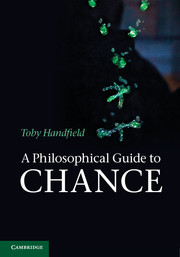Book contents
- Frontmatter
- Contents
- Preface
- 1 The concept of chance
- 2 The classical picture: What is the world made of?
- 3 Ways the world might be
- 4 Possibilities of thought
- 5 Chance in phase space
- 6 Possibilist theories of chance
- 7 Actualist theories of chance
- 8 Anti-realist theories of chance
- 9 Chance in quantum physics
- 10 Chance in branching worlds
- 11 Time and evidence
- 12 Debunking chance
- References
- Index
Preface
Published online by Cambridge University Press: 05 June 2012
- Frontmatter
- Contents
- Preface
- 1 The concept of chance
- 2 The classical picture: What is the world made of?
- 3 Ways the world might be
- 4 Possibilities of thought
- 5 Chance in phase space
- 6 Possibilist theories of chance
- 7 Actualist theories of chance
- 8 Anti-realist theories of chance
- 9 Chance in quantum physics
- 10 Chance in branching worlds
- 11 Time and evidence
- 12 Debunking chance
- References
- Index
Summary
When I began writing this book, I believed that I had identified a realist theory of chance which – though not entirely novel – had not been defended as well as it might have been. My book was to have been the definitive presentation and defence of a realist account.
Roughly six years later, I have come to appreciate much better the enormous difficulties facing not only that theory, but all realist accounts of chance, and I find myself in the mildly embarrassing position of writing the preface to a book in which I defend a modest form of anti-realism. In some sense, I now believe, Hume was correct to say that chance has no ‘real being’ in nature (Hume 1902 [1777]: §8, part I).
During this gradual conversion, becoming better acquainted with the literature, I frequently found the going rather difficult. Much of the literature is very technical, to the point of being inaccessible to many readers, including myself. This is unfortunate. Our best physical theories strongly suggest that chances are a fundamental part of reality. If we are to understand and evaluate these claims, we need to understand philosophical and scientific debates about chance. In consequence, I have written this book, not merely as a vehicle for my own ideas, but also to introduce the philosophy of chance to the broadest possible audience. While I don't pretend that the material is always easy, I expect it should at least be accessible to any tertiary-level reader.
- Type
- Chapter
- Information
- A Philosophical Guide to ChancePhysical Probability, pp. vii - viiiPublisher: Cambridge University PressPrint publication year: 2012

